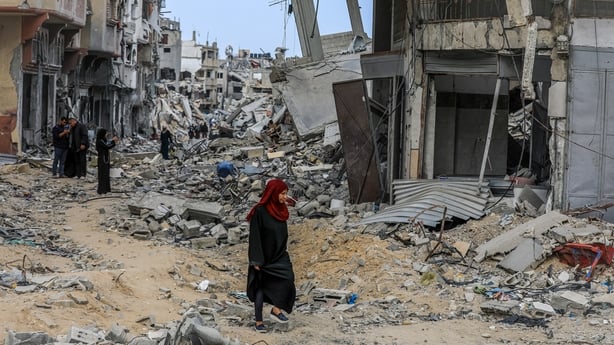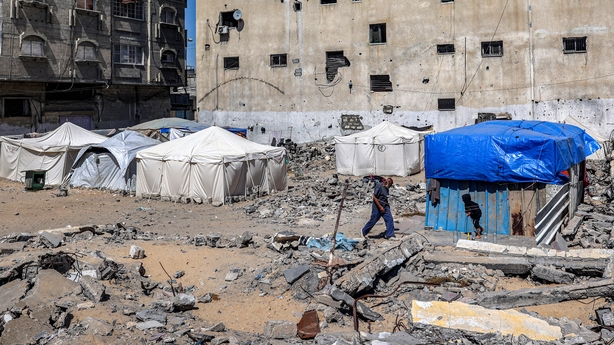US President Joe Biden has said Israeli Prime Minister Benjamin Netanyahu's Gaza policy was a "mistake" and urged Israel to call for a ceasefire, in an interview aired on Tuesday.
Mr Biden's comments were some of his strongest criticism yet of Mr Netanyahu amid growing tensions over the civilian death toll from Israel's war on Hamas and dire conditions inside Gaza.
"I think what he's doing is a mistake. I don't agree with his approach," President Biden told Univision, a US Spanish-language TV network, when asked about Mr Netanyahu's handling of the war.
Mr Biden reiterated that an Israeli drone attack last week that killed seven aid workers from a US-based charity in Gaza - and sparked a tense phone call with Mr Netanyahu - was "outrageous."
"So, I what I'm calling for is for the Israelis to just call for a ceasefire, allow for the next six, eight weeks, total access to all food and medicine going into the country," added Mr Biden.
His remarks on a ceasefire marked a shift from his previous comments, in which he has said the burden lies with Hamas to agree to a truce and hostage release deal.
President Biden also stepped up pressure on Israel to let more aid into devastated Gaza, saying he had spoken with Saudi Arabia, Jordan and Egypt and they were "prepared to move this food in".
"There's no excuse to not provide for the medical and the food needs of those people. It should be done now," he added.
The Biden interview underlined the dramatic shift his Israel policy since Israel's killings of the World Central Kitchen aid workers in Gaza sparked global outrage.
Hamas says Israeli truce proposal is under review
Hamas has said that an Israeli proposal on a ceasefire in their war in Gaza did not meet the demands of Palestinian militant factions, but it would study the offer further and deliver its response to mediators.
The proposal was handed to the Palestinian Islamist movement by Egyptian and Qatari mediators at talks in Cairo that aim to find a way out of the war in Gaza, now in its seventh month.
Residents said Israeli forces kept up airstrikes on Deir Al-Balah in central Gaza and Rafah on the enclave's southern edge.
Israeli Prime Minister Benjamin Netanyahu has repeatedly flagged plans for a ground assault on Rafah, where more than one million displaced civilians are seeking refuge, despite international pleas for restraint.
The talks in Cairo, also attended by the director of the US Central Intelligence Agency (CIA) William Burns, have so far failed to reach a breakthrough towards pausing the war.
In a statement following the latest ceasefire proposal, Hamas said: "The movement (Hamas) is interested in reaching an agreement that puts an end to the aggression on our people.
"Despite that, the Israeli position remains intransigent and it didn't meet any of the demands of our people and our resistance."
It said it would review the proposal further and go back to the mediators with its response.

Hamas wants any agreement to secure an end to the Israeli military offensive, a withdrawal of Israeli forces from Gaza and to allow displaced people to return to their homes across the small, densely populated enclave.
Israel's immediate aim is to secure the release of hostages seized by Hamas in the 7 October cross-border attack that prompted the conflict.
It says it will not end the war until it annihilates Hamas, which has run Gaza since 2007.
We need your consent to load this rte-player contentWe use rte-player to manage extra content that can set cookies on your device and collect data about your activity. Please review their details and accept them to load the content.Manage Preferences
In Washington, US Secretary of State Antony Blinken said 400 aid trucks had been cleared to enter Gaza the previous day, describing it as the most since the war started six months ago.
He said a good ceasefire offer had been presented to Hamas, which should accept it.
Israel said aid is moving into Gaza more quickly after international pressure to increase access, but the amount is disputed and the United Nations said it is still much less than the bare minimum to meet humanitarian needs.
Israel pulled back most of its ground forces from southern Gaza this week after months of fighting, but still said it plans to launch an assault on Rafah, on Gaza's southern border with Egypt, where more than half of Gazans are now sheltering.

In one of the first signs of concrete preparations for a ground assault, Israeli media reported that the Israeli defence ministry was purchasing 40,000 tents ahead of an evacuation of the city.
The United States has warned Israel not to storm Rafah due to the high risk of civilian casualties and US and Israeli officials will meet in person in a couple of weeks to discuss the matter, the White House said.
"I don't anticipate any actions being taken before those talks and for that matter I don't see anything imminent ... It remains our conviction that major military operations in Rafah would be extremely dangerous for civilians who would be caught in harm’s way," Mr Blinken told reporters in Washington.
Of the 253 hostages Hamas abducted in its 7 October raid, 133 remain captive.
Negotiators have spoken of around 40 going free in the first stage of a deal.
Hamas fighters killed 1,200 people in southern Israel in the 7 October attack, according to Israeli tallies.
At least 33,360 Palestinians have been confirmed killed in six months of war, Gaza's health ministry said in an update, with thousands more dead feared unrecovered in the rubble.
Most of the enclave's 2.3 million people are displaced and many at risk of famine.
Palestinian emergency teams supported by international organisations searched through the rubble of Al Shifa Hospital in Gaza City and the city of Khan Younis in the south following the withdrawal of Israeli troops.
So far, the teams have recovered 409 bodies of Palestinians killed in the hospital and its surrounding neighbourhood and in Khan Younis, according to Mahmoud Basal, spokesperson for the Hamas-run Gaza Civil Emergency Service.
Israel said Al Shifa was used as a militant base, which Hamas denies.
An Israeli airstrike on a municipality building in the Al-Maghazi camp in central Gaza killed the head of its council, Hatem Al-Ghamri, and four other civilians, the Hamas-run government media office and medics said.
The Israeli military said it had eliminated Mr Al-Ghamri, who it described as a military operative in Hamas' Maghazi Battalion involved in rocket launches against Israel.

